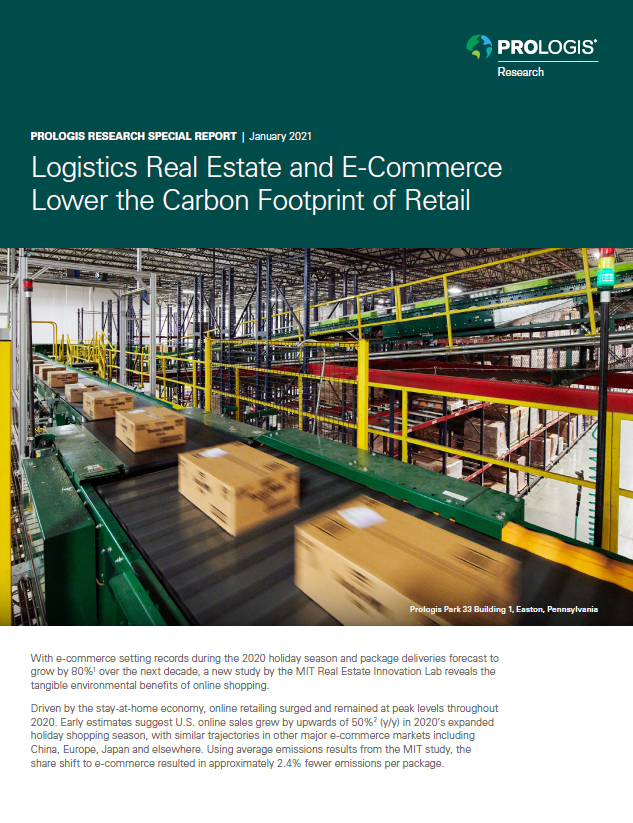With online sales unlikely to drop back to pre-Covid levels, demand for space in which to store goods destined for home delivery will only increase. Indeed, figures from CBRE suggest that for every extra £1 billion spent by British consumers online, an additional 900,000 sq. ft. of logistics space is needed and nowhere is this need more acute than in areas close to dense populations, such as London.
But just how sustainable is online shopping?
A global research study has revealed that online shopping brings clear sustainability benefits and that urban logistics facilities, like those needed to serve dense populations such a London, could dramatically reduce transportation-related carbon emissions.
The report entitled Lowering the carbon footprint of retail, was produced by the MIT Real Estate Innovation Lab for Prologis and reveals that the carbon emissions generated by online shopping are 36% lower, on average, than those produced by visits to bricks and mortar stores. This carbon saving was achieved even after factoring in higher returns and increased packaging. Indeed, the research shows that a full standard delivery van can replace more than 100 individual car trips to collect items.
With London’s population expected to grow to almost 10 million in 2030, demand for last-mile logistics facilities – where shipments are delivered to a transportation hub from where they make a short journey to their final destination – will only increase. By placing goods as close as possible to the end consumer, the report found that these urban fulfilment centres can reduce carbon emissions by a further 50% whilst speeding up delivery and reducing overall cost.
The added benefit of placing last-mile logistics facilities close to the end consumer is that shorter delivery routes lend themselves perfectly to the use of sustainable forms of transportation, such as electric vans and bikes. The report notes that EV technology can decrease average transportation-related emissions by 27% and has the added benefit of reduced traffic noise, both of which will be welcome news for the communities in which these last mile logistics facilities are located.
Consumer shopping habits have a direct effect on the built environment and the recent increase in online shopping, fuelled by the pandemic, has led to increased demand for industrial logistics buildings where goods can be stored before being packaged and delivered to people’s homes.
Whilst home deliveries are often cited as being harmful to the environment, this research clearly shows that online shopping actually reduces carbon emissions, even after you factor in the higher return rates and packaging associated with this type of purchase. It also demonstrates that, far from contributing to higher emissions, last-mile logistics facilities can help to reduce emissions, traffic noise and congestion, especially where modes of electric transport are utlilised.
Whilst the report focuses on the transportation element of online shopping, it’s also important to consider the role that logistics buildings play in a sustainable supply chain. Today’s logistics warehouses are very energy efficient and some new buildings are already ‘net-zero’ and going above industry certification to take the whole lifecycle of the building into account.
We know that every £1 billion of spent online requires approximately 900,000 sq. ft. of warehouse space and if volumes continue to grow as expected, figures from Knight Frank suggest that we will need an additional 92 million sq. ft. of space over the next four years. With the support of our customers, we are already working hard to meet this demand by developing state-of-the-art sustainable buildings and ensuring that the shift to online sales delivers maximum benefit for the environment, local economies and communities.
Download your copy below:


